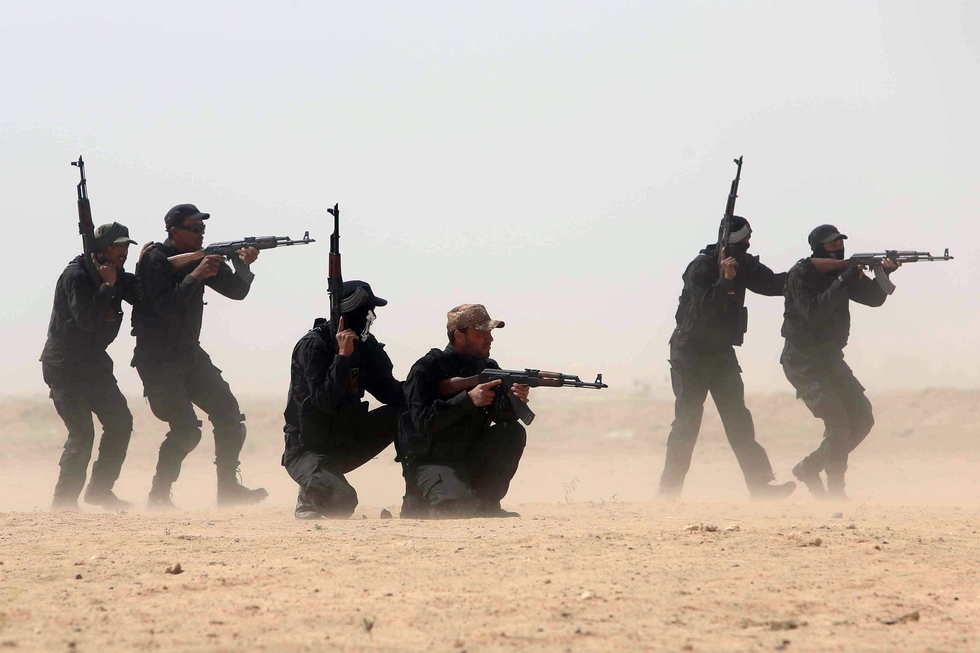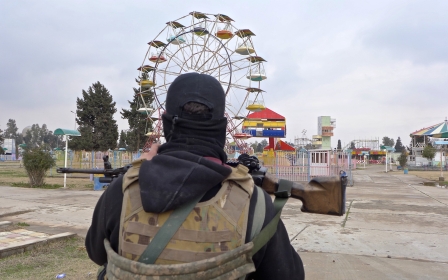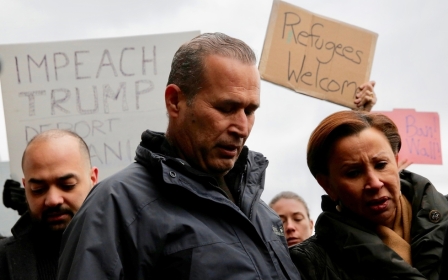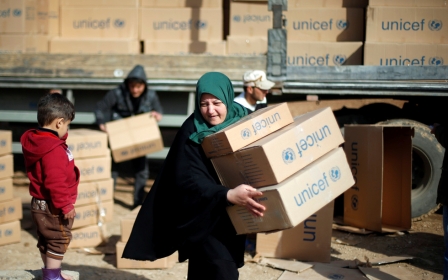Iraqi militias fighting IS slam 'disrespect' of Trump ban

Iraq's Popular Mobilisation Units have seen themselves as being the vanguard of the fight against the Islamic State group, whose actions have shocked the world and helped stoke the rise of anti-Muslim sentiment and authoritarian nationalism.
But now fighters with the PMUs have found themselves on the receiving end of a US ban on Muslims imposed by the US president, Donald Trump.
The anger at the move has led to their official spokesperson calling for US nationals to be banned and expelled from Iraq.
Private Hassan al-Rithaa, from Brigade 20 of the PMUs, said that the new executive order made it feel like he and the US were "enemies that are fighting IS at the same time."
"It is sad that there is no nuance between IS and other people. IS is from al-Qaeda, it is a branch of extremist Islam that even Sunni people are targeted by, even though the organisations are officially a Sunni group," he told Middle East Eye.
"This is doubly hurtful to the Shia community because they are both a target of IS and now classed as same level as IS.
"After IS, I am worried that we are the next target for the Trump government because - like Saddam Hussein did - they will consider us Iranian because we are Shia. Forgetting all our sacrifices for Iraq because of our religion."
The PMUs, many of which were formed in 2014 following a ruling from Ayatollah Ali al-Sistani - the most senior Shia cleric in Iraq - have been highly controversial.
"We are fighting on behalf of the whole world, it would be nice to get some respect for our sacrifices."
The groups have been accused of carrying out indiscriminate reprisals against Iraqi Sunnis, whom they accuse of harbouring IS. Many of the militia recieve funding and support from Iran, another country targeted by Trump's executive order.
When IS captured Mosul in June 2014, the Iraqi army - underfunded, undertrained and riddled with corruption - melted away and the militant group began to spread across Iraq. Into the vacuum poured the militias, who many cite as having checked the growth of IS and prevented them entering Baghdad.
However, despite their numerous successes against IS, the PMUs have been prevented from entering the centre of Mosul over fears that it could lead to sectarian strife and human rights abuses. Amnesty International in January accused the militias of "extrajudicially executed, tortured and abducted thousands of men and boys."
But they still remain enormously popular in Iraq - sending jitters through the deeply unpopular political class - and greatly resent being effectively grouped with organisations they have sworn to destroy.
"We are fighting on behalf of the whole world, it would be nice to get some respect for our sacrifices," said Haitham Jabouri, a Molazim (Captain) in the PMUs originally from Sunni-majority Tikrit in central Iraq.
Muslim Americans fearful of Trump ban but heartened by protests
"The US has been a poor friend to Iraq because it tries to balance its relationship with states like Turkey and Saudi Arabia which have their own plan for Iraq."
Many commentators have noted that a number of countries which have been noted in past as sources of recruitment for groups like al-Qaeda and IS have been left off the list of nations banned by the executive order, such as Saudi Arabia and Qatar.
"We found out that us Iraqi people that fight IS day and night are classified the same as IS but Saudi Arabia - the heart of IS ideology around the world - is not?" said Jabouri.
"This is how you let terrorism rise in your country. Mark my words, Saudi Arabia will keep sponsoring the most radical Mosques in the world that lead to terrorism and the US will do nothing about it."
Hassan Al-Rithaa suggested that it was because Iraqis "don't have enough bribe money."
'Key partners'
Despite the ban, however, Trump's repeated claims that he will "destroy" IS and implications that he will act more heavily against the group than President Obama, has found favour with some Iraqis who saw Obama as too timid.
Following Trump's election in November, Iraqi Prime Minister Haider al-Abadi said that the President-elect had contacted him and promised "strong and firm support" for the Iraqi government, describing them as "key partners." Trump also reportedly invited Abadi to come to Washington after the inauguration - with the Prime Minister, as a diplomat, presumably exempt from the executive order.
"In 2013 and 2014 the Obama government did not commit to helping Iraq until Erbil was attacked in the Kurdish region," complained Rithaa. "Even as the Yazidi people were being enslaved by IS the US stood by until it got to the point of genocide. Iraq's government begged for support but nothing until thousands were dying in a day."
"Trump says many things about bombing IS harder and this is good if it is coordinated - we do not want to have our country destroyed for a foreign government to say 'Mission Accomplished' again," he added, referring to former President George W. Bush's comments after the 2003 invasion.
"Many countries would love to have a piece of our resources and would treat us as equals not as beneath them."
On Saturday, Trump released an executive memorandum titled "Plan to Defeat the Islamic State of Iraq and Syria", outlining the development of a new strategy to defeat the group.
As early as May 2015, Trump claimed he had a plan to defeat IS, but refused to disclose it, saying he "didn't want the enemy to know what I’m doing."
However, a raid in Yemen over the weekend - the first military operation enacted under the new administration - killed at least 14 members of al-Qaeda as well as a US commandor and the eight-year-old daughter of al-Qaeda ideologue Anwar al-Awlaki, killed in a US drone in 2001.
The attack was aimed at showing that no-one should be under the impression that Trump will take a softly-softly approach to his enemies. But the world is yet to see what strategic changes are likely to take place with regards to IS.
"Trump says many things, we are waiting to see what happens in the battlefield before I comment further," said Jabouri. "The US is the single most powerful country in the world, they can do what they want. If they wanted to destroy IS they could. Obama didn’t help us until the last minute because politics is more important than Iraqi lives."
Scepticism has long abounded among the PMUs with regards to the US's role in Iraq. Some Iraqis buy into conspiracy theories suggesting the CIA or the US's close ally Israel are responsible for creating IS and that the longterm US plan is to stoke Sunni and Shia tensions as a means of dividing opposition to Israel. Other claim that the US has little interest in the country beyond coveting their oil resources.
Ali al-Tamimi, the governor of Baghdad, even claimed previously that US air forces had been "hitting Iraqi forces and the PMUs" rather than IS during their air raids. The fact that many PMU fighters - particularly those with the Iranian-backed Badr Organisation or Muqtada al-Sadr's Mahdi Army - fought against US-led forces during the occupation of Iraq has made them uneasy allies.
In light of all this, Trump's ban has seriously enflamed an already tense relationship and politicians have called for reciprocation. On Monday, the Iraqi parliament voted to call on the government to take "reciprocal measures" against US citizens, while Muqtada al-Sadr called for US nationals to leave Iraq.
However, Rithaa said the government should not be too quick to retaliate.
"No this is not a just way. Eye for an eye is not diplomatic," he suggested. "We must first talk between governments."
But he said that if the US was happy to severe its relationship with Iraq in favour of the Gulf states, Iraq would have to "answer in kind."
"Many countries would love to have a piece of our resources and would treat us as equals not as beneath them."
Haitham Jabouri was much more unequivicol about his country's response.
"If the US government does not change this [ban] for the Iraqi people than yes, we must maintain the dignity of Iraq," he said. "We do not need an 'ally' that changes their opinion of your entire people at a whim, one day helping, and another day banning. We need real allies that respect Iraq, its sacrifices and most importantly our people.
"They have jets, artillery and advisers but no US ground troops fighting IS. That is entirely Iraqi sacrifice on the ground. You cannot defeat IS without boots on the ground and we are the boots.
"They should leave if they make Iraqi nationals leave the US."
New MEE newsletter: Jerusalem Dispatch
Sign up to get the latest insights and analysis on Israel-Palestine, alongside Turkey Unpacked and other MEE newsletters
Middle East Eye delivers independent and unrivalled coverage and analysis of the Middle East, North Africa and beyond. To learn more about republishing this content and the associated fees, please fill out this form. More about MEE can be found here.




